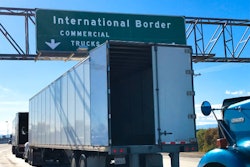Trucking news and briefs for Friday, July 18, 2025:
Cargo theft continued to soar in Q2
 Verisk CargoNet recorded 884 cargo theft incidents during the second quarter of 2025 with a total loss value of more than $61.5 million.Verisk CargoNet
Verisk CargoNet recorded 884 cargo theft incidents during the second quarter of 2025 with a total loss value of more than $61.5 million.Verisk CargoNet
CargoNet, a Verisk Analytics product, recorded 884 supply chain theft events across the United States and Canada in the second quarter of 2025, representing a 13% increase compared to the same period in 2024 and a 10% increase from the first quarter of 2025.
While the reported total loss value was $61.6 million, the estimated total loss value exceeded $128 million when applying average loss values to incidents where specific values were not reported.
The data reveals an acceleration in theft activity throughout the quarter, with incidents increasing 14.6% in April, 4.4% in May, and a substantial 21.9% surge in June, CargoNet added.
Metals theft experienced the most dramatic increase during Q2, nearly doubling with a 96% year-over-year surge to 53 incidents. This unprecedented growth coincides with copper trading near or above record highs, the firm noted, suggesting that organized crime groups strategically adjust their targeting based on commodity market values.
Food and beverage products also saw substantial growth, with 180 reported incidents representing a 68% increase from Q2 2024. This category now accounts for more than 20% of all cargo thefts, with alcoholic beverages, energy drinks, and meat products being primary targets.
[Related: Mitigating cyber-enabled cargo theft]
"The strategic targeting of specific commodities reveals the business-like approach of modern cargo theft operations," said Keith Lewis, vice president of operations for Verisk CargoNet, "These aren't opportunistic crimes -- they're calculated operations targeting goods with the highest illicit-market value and easiest resale potential."
The average stolen shipment value of $203,586 represents a significant economic impact on the supply chain, which CargoNet said results in increased insurance costs, delivery delays, replacement orders, and ultimately higher consumer prices.
Looking ahead to the remainder of 2025, CargoNet analysts warn that complex cargo theft schemes involving document fraud and identity theft are becoming increasingly prevalent. These sophisticated operations, often perpetrated by international organized crime groups, are evolving rapidly to circumvent industry anti-fraud efforts, the firm added.
"Traditional physical security measures alone are no longer sufficient," Lewis added. "The industry must adopt a multi-layered approach combining physical security, digital verification, and real-time intelligence sharing to combat these evolving threats."
[Related: Cargo theft: How fleets can protect freight]
Hawaii gets CDL testing reprieve
The Federal Motor Carrier Safety Administration has granted an exemption to the state of Hawaii that e to waive specific portions of the commercial driver’s license (CDL) skills test for CDL applicants who take the skills test on the islands of Lanai and Molokai and issue these drivers a restricted CDL.
Drivers who receive a restricted CDL under the provisions of the exemption are also exempt from the entry-level driver training (ELDT) regulations.
Hawaii already has a two-year exemption for this purpose, but that exemption will expire on February 20, 2026. Lanai and Molokai are some of the smaller islands in Hawaii, with a combine population of about 10,000 and less than 500 square miles of area.
FMCSA said in its decision to grant a five-year waiver that “roadway limitations (e.g., the number of lanes and maximum speed limits) provide an effective safeguard to prevent exempted drivers from operating under conditions for which they have not demonstrated their abilities through completion of an ELDT program that meets FMCSA’s requirements, or a complete CDL skills test that would enable the State to issue an unrestricted CDL.”
The exemption is now effective through July 17, 2030.
Daimler rolls 850,000th truck from North Carolina assembly plant
Daimler Truck North America LLC (DTNA) earlier this month announced the production of its 850,000th truck at its Cleveland, North Carolina, manufacturing plant, marking a major milestone in the company’s U.S. manufacturing legacy.
The milestone vehicle – a Western Star 47X – was delivered to Alamo Group, a long-standing DTNA customer. The truck will be provided to Alamo Group’s Snow & Ice Team, which delivers a full suite of solutions designed for municipal, highway, and airport winter maintenance operations.
“We’re honored to receive this milestone truck and continue our strong relationship with DTNA,” said Jean Philippe Bourque, group vice president of Alamo Group’s Snow and Ice Division. “The Western Star 47X is a critical part of our portfolio, and our customers value the reliability, performance, and support that comes with it.”
Established in 1989, DTNA’s Cleveland Truck Manufacturing Plant is the company’s largest heavy-duty truck plant in the U.S., spanning 1.2 million square feet on 178 acres. The facility employs approximately 2,000 people and right now assembles the Fifth Generation Freightliner Cascadia and Western Star 47X and 49X.
As one out of nine North American manufacturing plants, the Cleveland plant is known for its flexible, complex manufacturing capabilities, integrating cutting-edge robotics and advanced lean manufacturing techniques. Despite the plant’s cutting-edge infrastructure, much of the truck assembly remains hands-on reflecting the precision, and craftsmanship the team brings to every Western Star built. It’s this balance of advanced technology and dedicated workmanship that defines DTNA’s approach to quality.
“Reaching 850,000 trucks is a testament to the dedication of our Cleveland team and the strength of our manufacturing processes,” said Jeff Allen, senior vice president of operations and specialty vehicles at DTNA. “This plant is not only a cornerstone of our production network - it’s a vital part of the Rowan County community here in the Carolinas.”
The Cleveland plant is also a leader in sustainability, operating as a zero-waste-to-landfill facility and contributing to DTNA’s broader goal of significantly reducing its environmental footprint by 2030 through improvements in emissions, water use, waste management, and energy efficiency.











